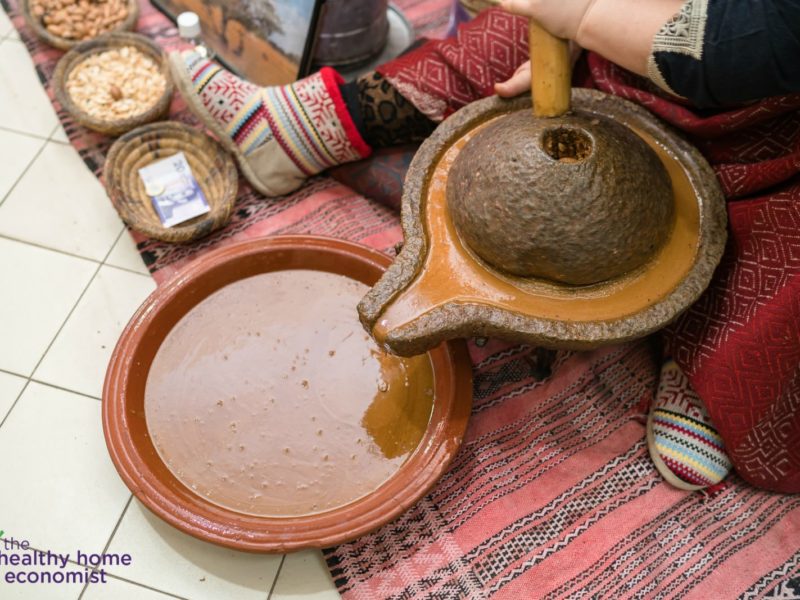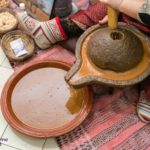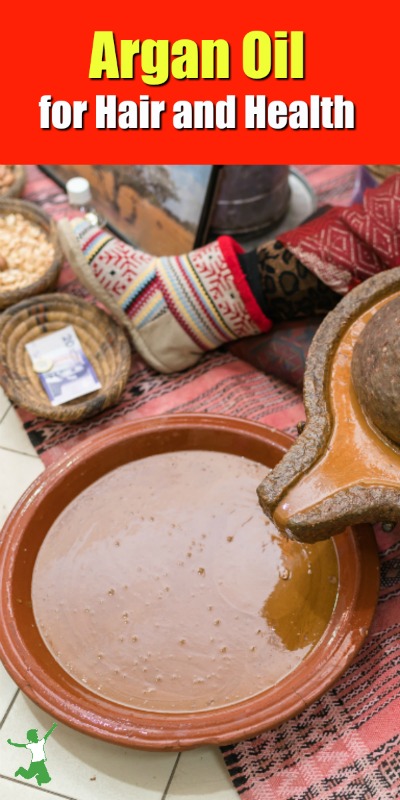Traditional to Moroccan cuisine and rich with antioxidants and essential fatty acids, argan oil benefits to health are rapidly becoming valued worldwide. Easy recipe for unrefined argan oil salad dressing included!
Argan oil benefits are becoming more well known in recent years. This is primarily due to its high quality as a natural cosmetic aid for external use.
In particular, consumers learning how to make personal care products such as homemade hair gel are figuring this out rather quickly. Using the highest quality oils achieves shiny hair and lustrous skin without any health risk from toxins. Argan oil and cocoa butter are some of the top oils to use for this purpose.
Surprisingly, the historical use of argan oil in Northern African cultures is actually as a food! In particular, it is a pleasing accompaniment to most any raw or lightly grilled dishes.
This golden oil is produced from the fruit kernels of the Argania spinosa or Argan tree, endemic to the Northern African country of Morocco.
Rich with antioxidant phytochemicals and essential fatty acids, argan oil benefits to health are well known and valued by local cultures and becoming widely acknowledged worldwide.
Argan Oil Fatty Acid Composition
Argan oil is about 80% unsaturated fat by composition, of which about 32% is essential linoleic fatty acids and 47% oleic acid. This makes it similar to canola oil. The difference is that argan oil is completely unhybridized, not genetically modified and much less likely to be tainted with free radicals.
Argan oil’s beneficial fatty acid composition also bears a certain resemblance to olive oil. However, argan oil is actually more stable and almost three times richer in vitamin E. The high content of tocopherols and the type of omega-3 fatty acids found in both soaked raw nuts and fish give it the unique capacity to help reduce rates of inflammation and neutralize free radicals within the body.
As a healthy and traditional fat, argan oil has been found to prevent oxidation and hence slow aging, while simultaneously stimulating digestion and boosting brain power. Argan oil contains rare sterol molecules and phytochemicals that cannot be found in other plant-derived oils.
How Argan Oil Benefits Health
Modern research is suggesting that argan oil benefits to health consist of the following when consumed as a whole food processed in a traditional manner:
- Powerful anti-oxidant action
- Stimulates the nervous system and builds brain capacity
- Reduces joint and rheumatism pain
- Calms hypertensive tendencies
- Facilitates digestion by increasing pepsin
- Stabilizes blood sugar/insulin levels
Modern Argan Oil Processing
As with any food, processing is key. There are two very different processes used to extract argan oil.
Make sure you aren’t fooled into buying industrialized argan oil!
- High-impact mechanical techniques employed by big companies.
- Traditional manual pressure extraction used in small native cooperatives.
The method of processing greatly affects the quality of the final product as well as argan oil benefits to health. In addition, processing of argan oil impacts the economic viability of the local peoples harvesting it and the sustainability of Argan forests.
If argan oil benefits are sought via consumption as a food, it is particularly important to source oil manufactured the traditional, manual way.
Traditional Processing
The following steps are followed to produce only the highest quality argan oil richest in antioxidants with no rancidity of the oil from overly aggressive processing (quality source):
- The argan fruits are harvested from stands of trees and left to dry on the roofs of mud houses.
- The pits are then manually removed with the help of two stones.
- A thin protective skin is peeled off, and the pits are subject to a light toasting, a key step for giving the oil its distinct savory flavor.
- The slightly heated pits are then ground and slowly kneaded in traditional stone mills to produce a creamy paste.
- After about 30 minutes of continuous mixing, and with the careful addition of small amounts of boiled water, the precious oil slowly dissociates from the rest of the paste.
- This shimmering golden liquid is argan oil in its true form.
Like truly authentic, 100% olive oil, please note that you get what you pay for when it comes to argan oil. If the price seems too good to be true, it is likely not pure and/or was processed in a manner that negatively impacts its benefits to health.
Also be sure the color is golden as shown in the picture below.
Enjoying Argan Oil in Your Kitchen
In native Moroccan cuisine, argan oil is used liberally to season dishes, acting as a dressing for salads and adding flavor to tagines, couscous, grilled vegetables and desserts.
Great chefs in Europe have also borrowed this secret, using the smooth qualities of argan oil to add depth and warmth to their exquisite dishes.

Easy Argan Oil Salad Dressing
Quick and easy basic salad dressing using argan oil for a dose of healthy fats to add depth of flavor to dishes and encourage hair and nail health from the inside out.
Ingredients
- 1/3 cup apple cider vinegar
- 1/2 cup extra virgin olive oil
- 2 tsp argan oil
- 2 Tbl raw honey
- 1 Tbl dijon mustard
Instructions
-
Mix the cider vinegar and oils together in a small bowl.
-
Emulsify the mustard and honey into the liquid with a fork.
-
Serve immediately.
-
Best made fresh every time you need it.

Have you tried argan oil? How have you been most enjoying its benefits in your home – externally, internally or both?
References
More Information
Get Your Fats Straight
Five Fats You Must Have in Your Kitchen
When Omega-3 Fats Can be Dangerous to your Health
The Truth About Pumpkin Seed Oil
Selecting a Healthy Cooking Oil and Reusing it Safely
Caution When Using Chicken Fat for Cooking
Cooking with Olive Oil: Yea or Nay?
How Vegetable Oils Make Us Fat
Is Rice Bran Oil a Healthy Fat?
Red Palm Oil Benefits Rival Coconut Oil
Walnut Oil
The Many Shades of Palm Oil








Argan oil is way worth it – I use an argan oil that has no harmful chemicals, and can be used on hair & skin – its the Somaluxe Argan Oil – I love this product it leaves my hair smooth, silky, and shiny! I couldn’t keep my hands out of my hair because it was so soft and it’s light or at least for my thick straight hair! I just hate that it’s only one size but will definitely repurchase. I never do reviews on products but it’s so good that I had to tell someone!!
It would be nice if the cultivation of Argan tree was taken up in Malaysia and Indonesia (besides other places) where we know a lot of deforestation is being caused due to monoculture plantations of palm oil. This tree looks like it could survive in semi arid/desert conditions so its cultivation should be taken up worldwide in such areas to help stop destruction of the Indonesian forests
We use it drizzled on tomato, cucumber, and onion salads, on scrambled eggs with cumin and garlic, on grilled fish, and of course to dip our homemade sourdough bread in it. But, one of the most amazing finds here is Amlou, which is argan oil mixed with almond butter and honey. It is heaven! I’m guessing it’s hard to find in the States, but I’m thinking there is no reason you couldn’t make it yourself.
I love your blog, recipes and articles, Sarah- thanks so much for enlightening us! When it comes to products like argan fruit from Morocco I just can’t help thinking of the local women and how they toil to produce such a high demand for the enjoyment of westerners and get very little in return. I work at a small skincare boutique and I cringe every time I look at the advertising for this one argan line which proudly boasts about how the argan comes from this small co-op. On the pamphlet you see these austere- looking women working in the hot sun on a dirt road in full hijabs and when you flip the pamphlet over you see the white- faced CEO with a fat smile. It’s just obvious she’s cashing in off of them and there local enironement and they are loosing any way you cut it.
Just like the rise in popularity with quinoa created food insecurity for local Peruvians the high demand for these resources actually creates world poverty. Even if the product is “fair trade” we are still extracting resources from “foreign” countries and we should always keep in mind the effects that this sort of modern day colonization has. Food produced locally is always best- best for the environment, people and our health.
Sarah, where do you find your argan oil? I too am new to ingesting it. Have been buying a very small quantity for my skin, and questioning its purity.
Thanks!
I live in Morocco so I’m lucky enough to buy the food grade argan oil very inexpensively. We use it drizzled on tomato, cucumber, and onion salads, on scrambled eggs with cumin and garlic, on grilled fish, and of course to dip our homemade sourdough bread in it. But, one of the most amazing finds here is Amlou, which is argan oil mixed with almond butter and honey. It is heaven! I’m guessing it’s hard to find in the States, but I’m thinking there is no reason you couldn’t make it yourself. Once you have this you’ll lose all interest in peanut butter.
Mixed with almond butter and honey sounds delicious! Thanks for sharing Sara!
I am going to try this asap … I have soaked/sprouted almond butter and raw honey on hand. Thanks for the tip!
How do you all afford this stuff? This stuff is spendy…..how do you stretch already tight budgets. I am not a miser…but I would love to be able to do these good things for my autistic kids…but our food and supp bill is already so high each month…and the income doesn’t always stretch….
I only use a small amount … 2 tsp per cup of salad dressing. One bottle goes a long way.
I have been using it on my nails after buffing them for a lovely shine, but didn’t know it was edible! Thanks!
I have been hearing a lot about argan in beauty products but not about consuming it. How interesting!
Have you applied this argan to your skin as well?
Thank you!